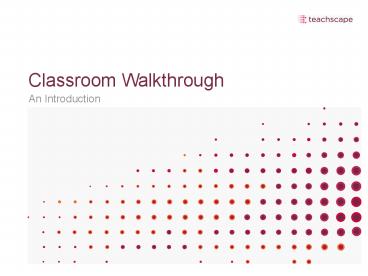Classroom Walkthrough - PowerPoint PPT Presentation
1 / 32
Title:
Classroom Walkthrough
Description:
Classroom Walkthrough An Introduction What are Classroom Walkthroughs? * Unlike a classroom observation which provides a view of a single classroom, a walk through ... – PowerPoint PPT presentation
Number of Views:262
Avg rating:3.0/5.0
Title: Classroom Walkthrough
1
Classroom Walkthrough
- An Introduction
2
What are Classroom Walkthroughs?
- Unlike a classroom observation which provides a
view of a single classroom, a walk through
creates a school-wide picture made up of many
small snapshots Its a strategy for providing a
school, not an individual teacher, with feedback
about what its doing or not doing - (Perry, as quoted in Richardson, 2001).
- Source Richardson, J. (2001). Seeing
through new eyes. Tools for Schools,
October/November, 17.
3
What is CWT?
- A way to focus on best practices every day
- A way to collect aggregate data to see the trends
of instructional practices in a school - A way to engage the school community in dialogue
about improving teaching and learning - A process for translating data to information to
action for improvement
4
How can CWT be used?
- To analyze patterns and trends in teaching and
learning - To monitor the efficacy of professional
development or other improvement strategies - To determine areas of focus for improvement
- To build professional culture and dialogue around
teaching and learning
5
What are some possible outcomes?
- Improved instructional practices
- Increased student engagement
- More positive interaction between school
leadership and students - Increased collaboration between school leaders
and teachers - Fewer disciplinary referrals
6
What CWT is not
- CWT is not a teacher evaluation
tool - CWT focuses on understanding and supporting the
improvement of classroom practice, not evaluation
of the performance of specific teachers or other
individuals
7
(No Transcript)
8
Planning with a Focus
- The CWT Process begins with a deliberate focus
What question(s) are we seeking to answer about
teaching and learning in our school?
9
(No Transcript)
10
Collecting Data
- Once a focus has been identified, data is
collected using a set of research-based look
fors
Look fors list of curriculum components,
instructional practices, and/or student
behaviors of which instructional leaders would
seek evidence during classroom visits
11
Focus on Curriculum
- Look Fors in this category
- Identify the learning objective(s)
- Determine whether the learning objective is
evident to students - Determine whether the learning objective is on
target for grade-level standards
12
Focus on Instruction
- Look Fors in this category
- Identify the instructional practices
- Identify student grouping format(s)
- Identify research-based instructional strategies
13
Focus on the Learner
- Look Fors in this category
- Identify student actions
- Identify instructional materials
- Determine the level(s) of student work
- Determine level of class engagement
14
Focus on Classroom Environment
- Look Fors in this category
- Identify routines and procedures, available
materials, student work, rubrics, exemplars,
etc., that support the learning objective
15
Focus on the Needs of All Learners
- Look Fors in this category
- Response to specific student learning needs
through differentiation in content, process,
product, learning environment
16
(No Transcript)
17
Analyzing Data
- Looking at many walks collected over time, data
can be analyzed
What are the trends? What are the patterns?
Where might there be connections?
18
(No Transcript)
19
Reflecting on the Data
Experience by itself is not enough. Reflection
on experience with subsequent action is the
pathway to renewal and continuous
improvement. York-Barr, J., Sommers, W. A.,
Ghere, G. S., Montie, J. (2006). Reflective
Practice to Improve Schools. (p. xx).
20
Reflective Practice
- Reflective practice is
- Taking a purposeful time-out to deliberately
process thinking - Actively analyzing a situation while considering
other viewpoints - Acquiring new awareness and understanding
- Taking action with newfound knowledge
21
Reflective Practice in CWT
- A time for group reflection on data about
classroom practice in our school - A time to turn data into actionable information
- A time to turnkey instructional improvement
22
(No Transcript)
23
Identifying Action Plan
- Reflective meetings culminate in the
identification and development of an action plan
A series of action steps in response to what is
learned from the walk data
24
(No Transcript)
25
Acting on Evaluating the Plan
- School community implements the agreed-upon
action plan - As the action plan is implemented, progress is
monitored by continued classroom walkthroughs
26
When are Classroom Walkthroughs Conducted?
- Anytime instruction is taking place
- Goal
- Every classroom
- Every week
27
CWT Signal
- My signal to let you know I am doing a classroom
walkthrough is
28
Length of a Classroom Walkthrough
- A classroom walkthrough should last no more than
- 4 to 7 minutes
29
Sample Walk 1
30
Sample Walk 2
31
Sample Walk 3
32
Reflection
- Take a few minutes to consider the following
- How can classroom walkthroughs support
instructional improvement and enhanced student
achievement in our building?































